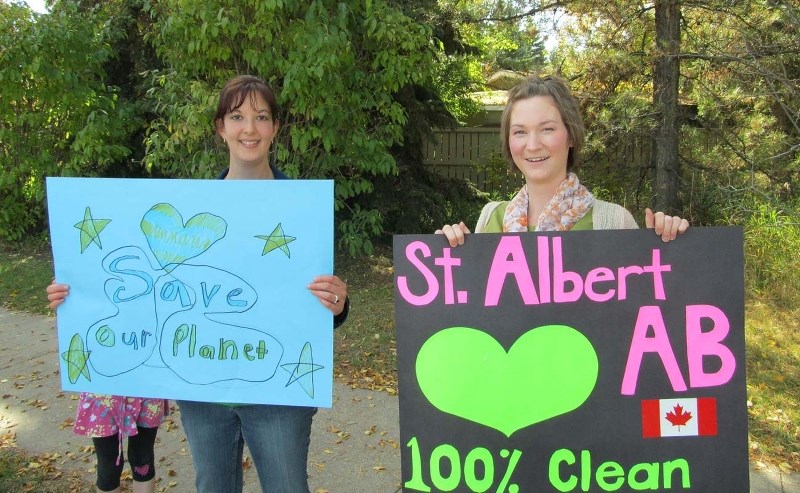City residents joined scores of others last week to take part in what was likely the biggest climate change march in history. Hundreds of thousands of activists took to the streets around the world Sept. 21 as part of the international People’s Climate March. Billed as the largest climate march in history, it involved some 2,646 marches in 162 countries. The largest one, in New York, drew some 310,000 people. The march coincided with a UN summit on climate change in New York attended by 120 world leaders, not including Canadian Prime Minister Stephen Harper (who sent federal environment minister Leona Aglukkaq instead). Radelle Rombough, a self-proclaimed armchair activist in St. Albert, rallied about 17 people at the corner of Boudreau and Sturgeon Road Sunday in support of the march. Rombough said she organized the march because she was concerned about how fossil fuel use was affecting the world’s climate and how that would affect her three children. “If this is going to affect my children and my grandchildren … I can’t relax till I know we’re actually doing something.” About 400 people came out to the Edmonton edition of the march last Sunday, said Mike Hudema of Greenpeace Canada’s Edmonton office. He said the turnout shows how people are starting to understand the urgency of the climate crisis. “We’re starting to see more extreme weather events both around the world and here in Canada,” he said. “The longer we wait to act, the worse those events will become.” Hudema criticized Canada’s lack of action on climate change, noting that its greenhouse gas emissions continued to rise, with the oilsands being the fastest growing source of them. He also called Harper’s decision to not attend the UN summit “disgraceful.” This huge march may have shifted the dynamic on climate change, Hudema said. He noted that the heirs to the Rockefeller oil fortune joined some 800 global investors this week that pledged to divest themselves of some $50 billion in fossil fuel investments over the next five years. “We need to keep the pressure on,” Hudema said. He encouraged Albertans to pressure the province to stop approving new oilsands projects and to encourage greater investment in renewable energy. A local environmental group hopes the city will help fix one of its oldest buildings to stop it from being invaded by mice. Big Lake Environment Support Society (BLESS) summer nature centre co-ordinator Meagan Dyck gave a report to council Monday on this year’s summer nature program. The program is based out of the old RCMP cabin by the St. Albert Trail bridge and offers a variety of free nature-related activities to visitors each summer. Dyck said this was a very successful year for the program, with about 1,342 people visiting the cabin. But the cabin itself was in rough shape. Its exterior walls had rotted in several places, letting mice invade during the winter. Dyck said she had to throw out most of its supplies and do extensive cleaning due to the extreme amount of mouse droppings. BLESS members also replaced the carpet, which had become quite stinky. The cabin dates back to about 1888, said Vino Vipulanantharajah of the MusĂ©e HĂ©ritage Museum. It has been rebuilt and moved several times, and has been at its current location since 1977. Al Henry, BLESS vice-president, asked council to repair the cabin. BLESS was still assessing the cost of the repairs, and hoped to apply for a grant to fund them. Henry hoped to have the cabin fixed before this winter in order to keep the mice out. Henry also asked council for a long-term lease on the cabin so they could expand the summer nature program. “We’ve got a lot of ideas,” he said, but they can’t move on them if they don’t have a place to run the program. BLESS has run the summer nature program out of the cabin since 2006.




